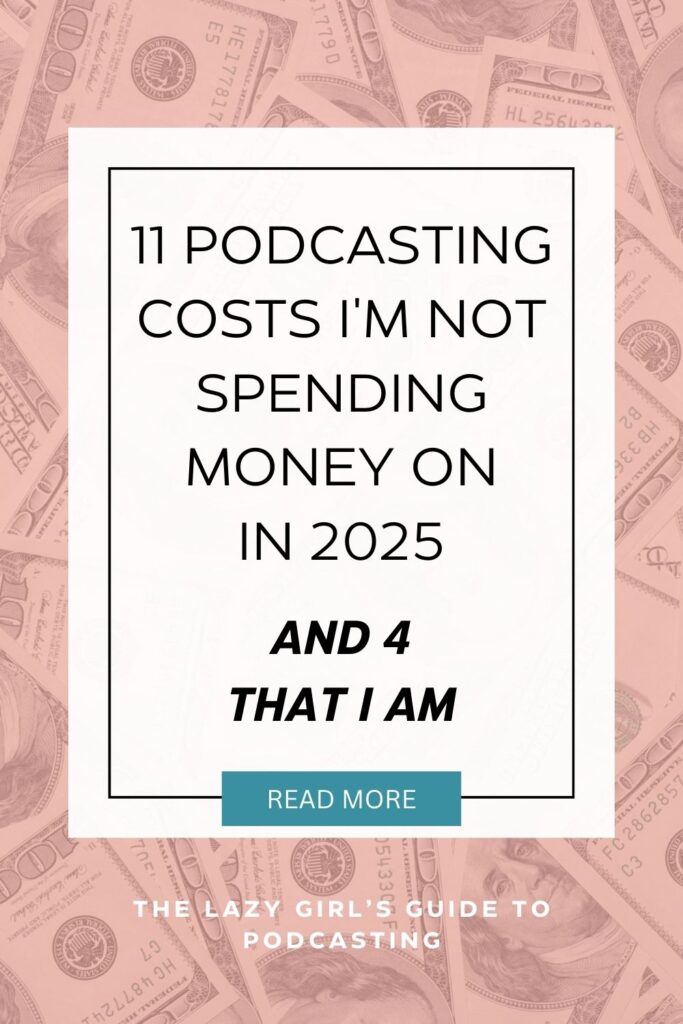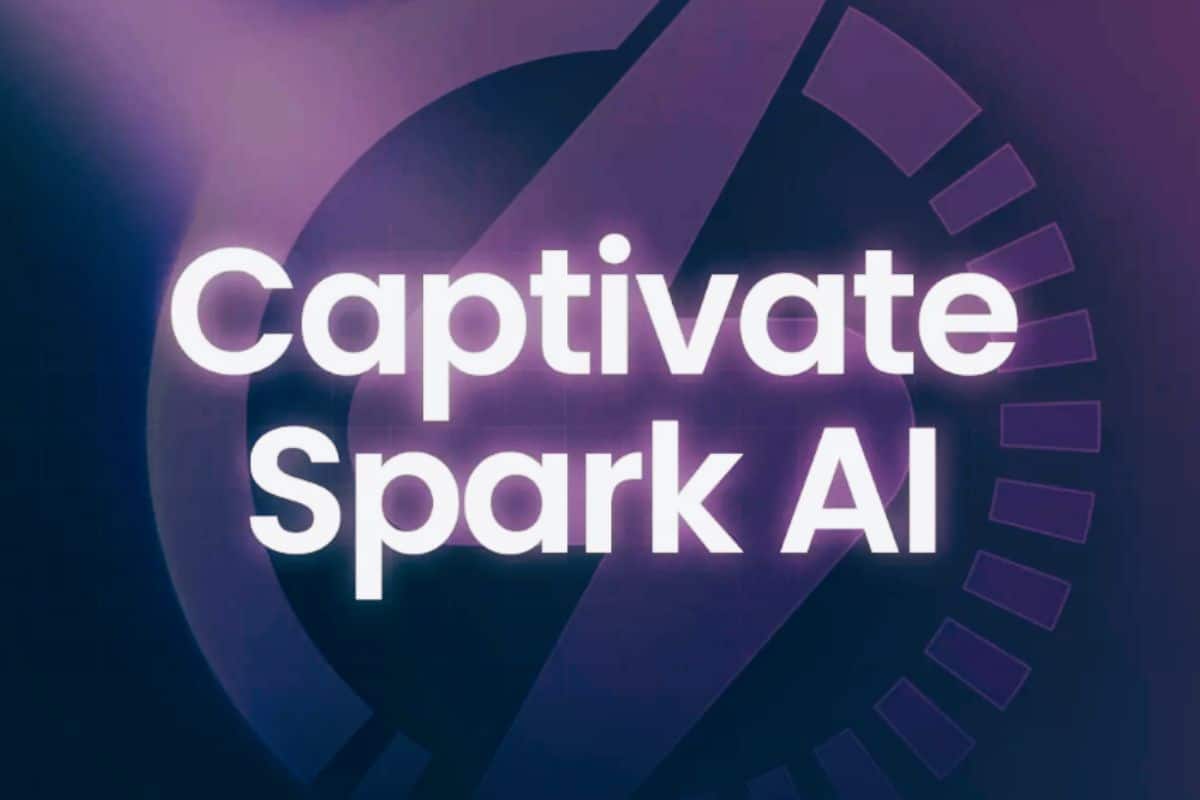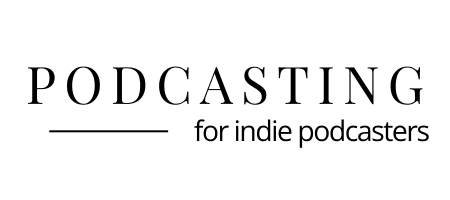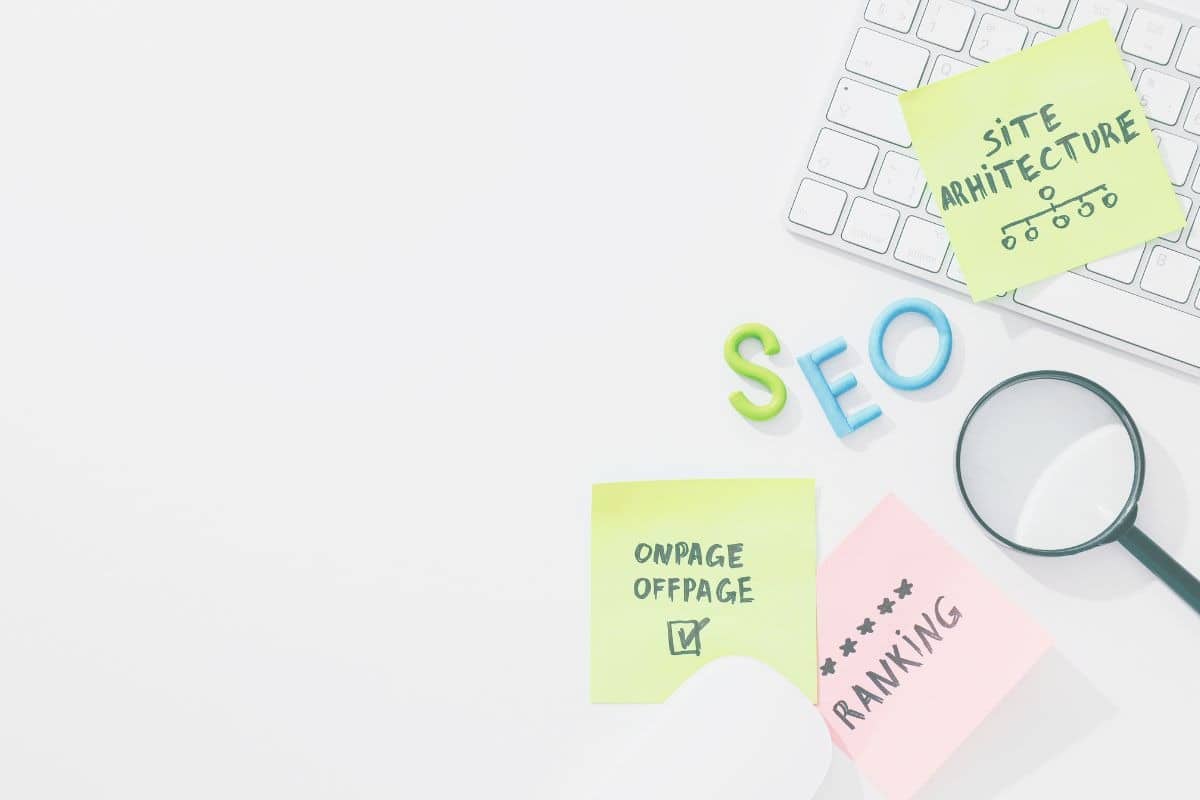
Podcast on a Budget: 11 Things I’m Not Spending Money on in 2025 for the Podcast and 4 That I Am
Running a podcast on a budget can often feel like a mammouth task. There always seems to be something else that you can spend money on that promises to improve or grow your show.
Recently, my YouTube algorithm has been bombarding me with videos on what people aren’t spending money on in 2025. Inspired by this trend, I’ve decided to reflect on what I’ll be saving on for my podcast. If you’re wondering how to start a podcast on a low budget or which expenses are unnecessary, this post is for you.
Let’s explore the things you don’t need to run your podcast and answer the question: What do you NEED to spend money on for your podcast?
11 Things You Don’t Need to Run Your Podcast
1. A Podcast Manager
Let’s start with the big one: hiring a podcast manager. A podcast manager oversees all aspects of your show, including episode planning, guest coordination, editing, marketing, and analytics. They are essentially a one-stop shop for podcasters who want to outsource operations. If you have a high workload or multiple podcasts, a manager can save time and ensure everything runs smoothly.
While I love the idea of delegating, I’ve never felt the need to pay for this service. Podcast managers can charge anywhere from hundreds to thousands of pounds per month. Unless they’re providing an essential service you can’t do yourself, why not keep that money in your pocket?
I prefer handling my podcast personally, as I enjoy the creative process and find it manageable within my schedule. Plus, hiring a podcast manager can cost hundreds or even thousands of pounds per month, which doesn’t align with my budget or priorities. Podcasting is a creative process I enjoy managing. I love brainstorming ideas, recording, editing, and even creating graphics. If you’re just starting out, take the time to learn these skills; you’ll save a fortune and gain a deeper connection to your show.
2. A Podcast Editor
A podcast editor polishes your audio by removing mistakes, adding effects, balancing sound levels, and making the overall episode more professional. and they’re a great option for podcasters who dislike editing or want studio-quality sound, hiring an editor can save time and improve production value.
Editing can feel daunting, but trust me, it’s manageable. I’ve always edited my own episodes, keeping the process simple and efficient. Paid editors can cost upwards of £50 per episode, which adds up quickly. Using free or affordable software like GarageBand or Audacity, you can edit your episodes without spending a penny. I also use a “one-for-one” editing approach: if it takes 20 minutes to record, I’ll spend 20-25 minutes editing. Perfection isn’t always necessary; authenticity matters more.
I keep my editing simple and efficient, using free tools like Garageband, iMovie, and Quicktime. The cost of £50 or more per episode isn’t justified for my style, as authenticity and relatability are more important to me than perfection.
3. A Podcast Promoter
Promoters help grow your audience by advertising your podcast through social media, email marketing, or collaborations. Some offer guarantees of increased downloads or chart placement. If your podcast needs a visibility boost or you lack time for marketing, a promoter could help.
But beware of cold pitches promising thousands of downloads for a small fee. These quick fixes often lead to unsustainable spikes in stats that don’t convert into loyal listeners. Instead, focus on organic growth strategies like SEO, networking, and listener engagement.
Most promotions offer short-term benefits without fostering genuine audience loyalty. I focus on organic growth through SEO, engaging content, and listener interaction. If someone promises to make your podcast number one on the charts for £100, ask yourself: what’s the long-term benefit? Spoiler alert: there probably isn’t one.
4. Paid Recording Software
Paid recording tools offer advanced features like multi-track recording, cloud storage, and enhanced editing options. Podcasters who may require advanced tools for collaboration or specific audio or editing needs might like to pay for recording software. However, free tools such as iMovie, GarageBand and QuickTime meet my needs. I prioritise simplicity and effectiveness over added features I don’t currently need.
Free tools like Photo Booth (for video) and Garageband or QuickTime (for audio) are my go-to options for recording. While there are shiny paid tools out there, they often don’t significantly improve sound quality. My biggest advice here is to stick with free solutions unless you’ve outgrown them and need an upgrade.
5. A Social Media Scheduler
Social media schedulers like Hootsuite or Buffer automate posting across platforms, saving time and ensuring consistency. They’re super useful for managing multiple accounts or maintaining a regular posting schedule.
Organic, SEO-focused content has proven more effective for my growth than relying on automation and social media posts to bring in new and recurring listeners. Scheduling tools can be tempting, but they’re not essential for podcast promotion. I’ve used a lifetime subscription to Content Studio, but over time, I’ve realised that organic posts and SEO-driven strategies outperform scheduled content. So for 2025, I’m going to be focusing more on creating searchable content with a solid SEO strategy rather than relying on social media algorithms.
6. Email Marketing Subscriptions
Email marketing tools like ConvertKit (now Kit) help you design campaigns, track performance, and engage with your audience through newsletters. They’re great for building a loyal listener base and sharing updates directly with your audience.
While newsletters can be a great way to engage listeners, you don’t need to pay for expensive email marketing services. I downgraded my ConvertKit subscription to their free plan, which still offers plenty of features.
7. A New Microphone
Microphones capture your voice for recording. Higher-end models promise better sound quality and advanced features and there are a tonne on the market for podcasters to choose from. My trusty Blue Yeti has served me well since the beginning, and I have no plans to replace it unless it breaks. You don’t need the latest, fanciest microphone to produce great content. Focus on using what you have effectively. Remember, you can have the most expensive microphone in the world but if you:
- Don’t know how to use it, or
- Don’t have a good recording setup
Then you aren’t going to be recording good audio, regardless of the price of your microphone.
8. New Headphones
Headphones help you monitor audio during recording and editing. Premium models offer better sound clarity and noise cancellation. If you’re editing intricate audio or working in noisy environments, high-quality headphones can be beneficial.
I’ve accumulated a small collection of headphones over the years—enough to last a lifetime! Whether I’m using my Soundcore noise-cancelling headphones or a basic pair of earbuds, they all get the job done. No need for upgrades here.
9. Additional Transcription Services
Transcription services are incredibly useful for podcasters. They convert your spoken audio into text, making your content more accessible to people with hearing impairments or those who prefer reading. Transcriptions also boost your podcast’s SEO, helping your episodes appear in search results more easily. Services like Otter.ai are popular options, but they often come with a monthly subscription or per-minute fees.
Instead of paying for a separate tool, I use Captivate Spark, which includes transcription features as part of the podcast hosting package. This integration saves me both time and money while still providing accurate, high-quality transcripts. By bundling this service with my hosting platform, I avoid the hassle and extra expense of managing a separate transcription tool.
10. Paid Advertising
Paid ads promote your podcast on platforms like Facebook, Instagram, or podcast directories. You can spend anywhere from £10 to thousands, depending on your goals. If you have a budget and want faster growth, advertising can reach new audiences quickly.
While advertising can be a great tool to grow your audience, it’s not something I’m investing in right now. Paid ads, whether on social media or podcast platforms, require careful targeting and ongoing spend. For many indie podcasters, the ROI isn’t guaranteed. Instead, I focus on organic growth methods like engaging with my audience and optimising SEO.
11. Custom Podcast Intro/Outro Music
Having a catchy intro and outro is great, but you don’t need to shell out money for custom compositions. There are plenty of royalty-free music libraries available online where you can find high-quality tracks for free or at a low cost.
Since getting rid of my intro and outro I see no need for getting more music to update these. And if I do reintroduce the intro or outro, I’ve got the original music that I purchased for less than $5 from Pond5.

What I Will Spend Money on in 2025
Whilst I believe that anyone can create an awesome podcast on a budget, there are a few things I consider worth the investment:
1. Website Hosting with Hostinger
For me, this website is part of the podcast. I use my website to create blog posts to promote most of the episodes that I create for the podcast, as well as other information that I feel podcasters will find useful when starting and growing their podcast. Because of this, I like to have full control over my website, rather than using a free one, or relying solely on social media.
For me, having complete control over my website is non-negotiable. As I said, it’s where I showcase my episodes, blog posts, and resources. A well-designed site enhances listener experience and drives traffic to the podcast. Hostinger offers affordable plans with excellent uptime and features, making it my hosting provider of choice. It might be the most expensive spend for my podcast, but for me, it’s an investment.
2. Captivate.FM
I’ve used various podcast hosting platforms over the years, but I’ve probably now been with Captivate.FM the longest. I use Captivate.FM for podcast hosting because it offers robust analytics, easy-to-use tools, and excellent support for podcasters. It’s an investment that streamlines the technical aspects of podcasting, letting me focus on creating content. Whilst there are free alternatives, I am happy to continue to paying £17 per month for access to all of the features that Captivate.FM give me for my podcast. Similar to website hosting, I don’t see this as a cost, but rather as an investment for the podcast.
3. Captivate Spark
Captivate Spark is an additional tool from Captivate.FM which was only released in 2024. It provides transcription services and helps improve accessibility for my podcast. Transcriptions make my content easier to consume for a wider audience and improve my SEO. This is a feature I can’t imagine going without. Whilst I’ve dabbled in using other services such as Otter.ai and SummarAIze, having an AI tool that is directly integrated into my podcast hosting platform is a no-brainer. As well as generating transcriptions and assets for my podcast, Captivate Spark also analyses my previous episodes and analytics to suggest episode ideas based on my most popular content.
Examples of AI assets that Captivate Spark generates include show notes, episode titles, company mentions, website mentions, keywords, timestamps, episode highlights, episode intro/overview, and so much more.
4. Canva Pro
Whilst there is a free version of Canva, I use it so much and for such a variety of projects that paying the yearly fee for Canva Pro is just a no-brainer for me. Canva Pro is a staple for creating episode graphics and promotional materials. It helps me maintain a consistent and professional brand image without needing a graphic designer. Things I use Canva Pro for include podcast episode artwork, social media graphics (including Pinterest Pins), website graphics, resources and freebies…the list goes on.
How to Start a Podcast on a Budget
If you’ve gone through the above lists and are now feeling motivated to start your own podcast, here are a few quick tips for getting started. Remember, starting a podcast doesn’t have to cost a fortune. It’s about creating quality content that resonates with your audience.
- Plan Your Content
- Define your niche and audience.
- Brainstorm ideas for your first 5–10 episodes to build momentum.
- Develop a consistent theme or structure for your show.
- Leverage Free and Low-Cost Tools
- Record and with free software like iMovie, QuickTime or GarageBand.
- Choose Affordable Hosting
- Start with budget-friendly options like Captivate.FM.
- Ensure your chosen platform offers good analytics and distribution.
- Focus on Organic Promotion
- Use SEO strategies to make your episodes discoverable.
- Share your podcast on social media, forums, and in niche communities.
- Encourage listeners to share and review your episodes.
- Use What You Already Have
- Begin with the equipment you own, like your phone, computer, or basic microphone.
- Create a quiet recording space at home to improve audio quality.
- Engage with Your Audience
- Build a relationship with your listeners through a medium that works best for you. This could include via a blog, social media or email.
- Take feedback seriously and adapt to audience preferences.
- Stay Consistent
- Stick to a regular release schedule to build trust and anticipation.
- Even if your setup isn’t perfect, consistency is key to growth.
Final Thoughts
Running a podcast on a budget is not only possible but can make it feel more enjoyable as well. By focusing on what truly matters: quality content and listener engagement. By focusing on these things you can create a successful show without breaking the bank.
Remember, it’s not about having the most expensive setup; it’s about understanding your audience and delivering value. Here’s to making 2025 the year of spending strategically on things that’ll help you get the most out of your podcast rather than chasing shiny-object syndrome.






